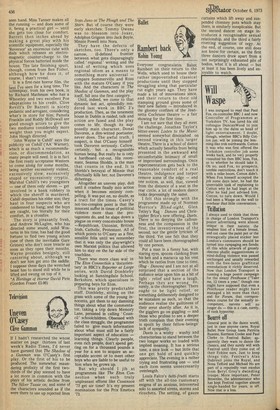Everyone congratulates Ballet Rambert on their return to the Wells,
which used to house their rather impoverished classical productions until they stopped struggling along that particular rut eight years ago. They have made a lot of innovations since, and their return to their old stamping ground gives some of their new ballets — introduced in the gloomy confines of the Jeannetta Cochrane theatre — a fair showing for the first time.
I am not sure that they all meet the challenge. Jonathan Taylor's
bitter-sweet Listen to the Music seemed somewhat diminished on
second viewing in this larger theatre., There is a school of dance which actually benefits from being presented in the awkward and uncomfortable intimacy of small or improvised surroundings. Once experimentation gets back to the reasonable comfort of a real theatre, indulgence and torpor remove some of the edge — and one notices, as well, that, viewed from the distance of a seat in the rear circle, a lot of modern dance looks depressingly the same. I felt this strongly with the programme made up of Norman
Morrice's Blind-sight, Glen
Tetley's Rag Dances and Christopher Brice's new offering, Duets. There is no denying the callous ness and the compassion in the first, the inventiveness of the
second, nor the gentle lyricism of the third. Yet one felt that they could all have been choreographed• by one person.
Put a man in a funny hat, with staring eyes, spoons clanking from his belt and a maracca up his vest which he rattles from time to time, (Rag. Dances) and I am not at all. surprised that a section of the audience seize upon him as a bit of light relief and have a laugh.
Perhaps they are wrong so, surely, is the choreographer. There
ought to be light relief, or something deliberately designed to be mistaken as such, so that the audience realise the guiltiness of their error shortly after. As it is, the gigglers go on giggling — and those who profess to see a deeper truth complain that their evening is spoilt by their fellow-beings' lack of sympathy. Duets is a wishy washy and characterless to stand between the two longer works so loaded with implied meaning. It has a serious tone, a nice look — but little that one get hold of and quickly appreciate. The evening is a rather trying and frustrating one — und each item seems unnecessarily overlength.
Louis Falco's tutti-frutti starts off with the all-too customary
enigma of an anxious, introverted solo to assorted sirens, storms and ricochets. The setting, of gauze curtains which lift away and suspended chimney pots which stay there, is similarly inexplicable. But the second dancer on stage introduces a recognisable sexual relationship, and the third a fairly rivetting suggestion of orgy. At the end, of course, one still does not know for certain, as the first three dancers draw apart from a not surprisingly exhausted pile of bodies, what it is all about — but ,at least it has been lively and enjoyable to watch.


































 Previous page
Previous page